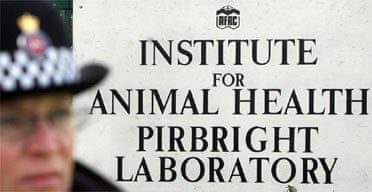An investigation into an outbreak of foot and mouth disease at a farm in Surrey has concluded there is a "strong probability" it originated at a neaby research institute.
Airborne carriage of the virus to the farm, or transfer in water during recent flooding appeared unlikely, the Health and Safety Executive said in its report. However, investigators were looking further into whether it could have been transmitted by "human movements" - including deliberate contamination.
The first of two outbreaks confirmed so far affected cattle on a farm near the village of Normandy, outside Guildford. The research institute in nearby Pirbright had been suspected as a source of the outbreak.
The Pirbright facility stores the foot and mouth virus for use in vaccines. It shares the site with the Institute for Animal Health (IAH), which is a diagnostic and research centre, and the pharmaceutical company Merial Animal Health, which makes vaccines.
Both organisations use the strain of the virus that was detected in slaughtered cattle on the first farm. Both said there was no evidence of any breach in their biosecurity.
The HSE report, ordered by the government on Sunday and released this evening, said the facility was the likely source, without specifying whether either individual organisation was suspected.
"Subject to the ongoing work detailed above, the indications are that there is a strong probability that the FMDV (foot and mouth disease virus) strain involved in the farm outbreak originated from the IAH or the Merial sites," the report concluded.
The prime minister, Gordon Brown, praised the report as a "determined effort ... to answer all the questions raised over the past few days".
So far there were still only two confirmed outbreaks of the virus, and tests on other suspected sites had proved negative, he said in a statement from Downing Street.
Asked whether it was likely the outbreak had been prevented from spreading further, he refused to speculate, saying only: "What I can say is that the efforts have been intensive to contain and control the flow of foot and mouth."
The HSE report said there was no evidence of incorrect working practices at the facility, or incidents such as leaks, which could mean contamination through the air.
While there were measures are in place at both sites of the facility to chemically treat liquid effluent before it entered the water system, "a number of biosecurity issues have arisen which are subject to ongoing investigation", the report said.
But the possibility of the virus spreading through waters after recent flooding was "negligible due to the distance, topography and direction of flow".
There were, however, "various potential routes for accidental or deliberate transfer of material from the site" through human movement, the report said.
"We have investigated site management systems and records and spoken to a number of employees. As a result we are pursuing lines of inquiry," it said, not explaining further.
Earlier today, a second outbreak of the disease was confirmed.
The chief veterinary officer, Debby Reynolds, said last night that cattle on a farm in Surrey within the 3km protection zone were being culled on the suspicion that they were carrying the disease.
At least 50 cows are thought to be involved in the second outbreak, besides the 97 already slaughtered over the weekend on the farm where the disease was first discovered last week.
Officials were investigating a third suspected outbreak, a local councillor told the Guardian.
Mike Nevins, who represents the Pirbright ward, said he had been told at an emergency meeting with police this morning that another farm in the area was now a "clinically suspected site".
Police sealed off the entrance to the farm this afternoon and Defra officials were said to be on their way.
The owner of the first herd to be culled, Roger Pride, whose father started farming the land 50 years ago, described the outbreak as "devastating".
He said his father had been the first to notice the cattle were unwell.
"They were drooling, with lots of saliva. They were very lethargic," Mr Pride said at a press conference held by the National Farmers' Union. "As a farmer, you know that something is drastically wrong."
